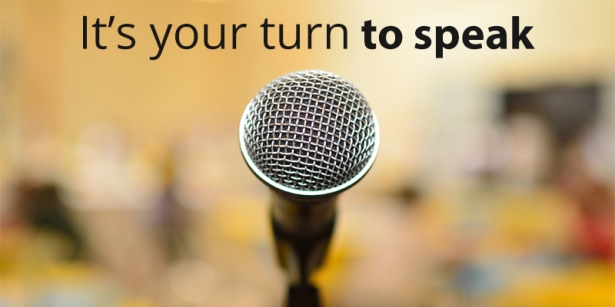
And you know what? It gets easier!
We all have the need to speak well in front of an audience at times during our lives. Whether you're speaking at your sister's wedding, addressing your team, teaching a course or speaking to a judge, we all want to do well. So why leave things to chance?
Here are some tips that will launch you into the speaking stratosphere.

1. Know your audience.
If you are speaking in front of an audience, there is usually a reason. Know who you are speaking to and what they want or need to take away. If it's friends and family, entertain them. If it's a corporate event, teach and inspire them. Knowing the demographic of the audience is imperative.


2. Rehearse, rehearse, rehearse.
Nothing becomes muscle memory unless you practice relentlessly. If you have a big speech coming up, make time every day to practice. Prepare your goals and the content well ahead of time. This can be done while driving, exercising, in the car, on a plane...anywhere.
3. Practice with distractions.
Once I know the content, I like to add a little bit of distraction to test how well prepared I really am. Turn on the TV or rehearse while pushing your child in the swing. Anything that adds a little more challenge.


4. Find a style that works for you.
Different events will often require a different approach or style. Sometimes reading a prepared speech is fine. But know it backward are forward so you're not staring down at the pages the whole time. Some use notes. Others prefer to be 100 percent scripted and memorized. If that's your style, memorize the content so well that you can go off script if needed -- and so you don't sound like you're reciting a poem. Use the proper approach for the appropriate event.
5. Know the environment.
Know the venue where you will be speaking. Get there well ahead of time. Walk the room. Walk the stage. Get a feel for the vibe of the environment so you are more comfortable when its "go time."


6. Test all equipment.
Nothing sucks more that last-minute technical difficulties. Avoid adding even more stress by testing any and all equipment and audio visual functions ahead of time. And have backups.
7. Practice in front of a mirror.
Practicing in front of a mirror is a good way to learn the proper amount of body motion, hand usage and facial expressions.
8. Take every opportunity to speak.
The only way to get better at anything is to do it all the time. Rehearsing is good, but nothing compares to actually getting up in front of an audience and doing it for real.
9. Practice body language and movement.
Remember, communication is much more about tone and body language than the words we say. The words of course matter, but emphasis comes with movement and body language.


10. Slow down.
We have some great sayings in the SEAL teams: "slow is smooth, and smooth is fast, " and "don't run to your death." Nothing shows nerves more than racing through your presentation. If you want to impact the audience in a meaningful way, make sure they actually hear what you are saying. Slow it down.
11. Make eye contact.
This one is very important, and it doesn't matter how big the audience is. Make eye contact with as many people as possible. It makes the audience members feel like you are speaking directly to them. And don't just stick to people in the first couple rows. Look at the people in the back too.


12. Know your material.
If your goal is to become a thought leader or actually teach the audience something, only a truly authentic understanding of the material will get you there.
13. Take long pauses.
Similar to slowing things down, make a point to take long pauses. And make them longer than you even think is appropriate. It can have a great impact on emphasizing key points and emotionally connecting to the audience.
14. Practice tone and projection.
Don't just eek your way through a speech using the same tone and volume. Tone and projection add a layer of entertainment and help keep the audience fully engaged from start to finish. These too must be practiced religiously.


15. Use humor and emotion.
It doesn't matter what you are talking about. There is always a place for emotion or humor, or both. I once gave a presentation about data analytics at a conference -- boring! So I made sure to weave in plenty of humor to spice things up. I find self-deprecating humor to work the best. And if you are starting to get emotional, so what? Use it. The audience may not remember everything you said, but they will remember how you made them feel.


16. Mentally prepare.
Find time during the hour before your speech for some solitude. Get your mind right. Clear your head. If it's five minutes before, just relax. The time for making sure you know the material perfectly has passed.
17. Exercise before you go on.
It's almost impossible to feel stress and anxiety after a good workout. If you have the time, exercise. The closer to your speech, the better. It's also a good time to practice. I like to rehearse while running or swimming.


18. Project confidence.
The more you project confidence, the more confident you are likely to feel. Get out there and own the room. Even if you are terrified. Fake it. Look people in the eye and command their attention.
19. Don't go over the allotted time.
When in doubt, go under the allotted time. Less is sometimes more. But never, ever, go over. It's poor speaking etiquette and shows you are not prepared. It's also disrespectful of the agenda for the event. Again, just practice.
20. Ask for feedback.
Most of us don't like to ask for feedback, especially when we know the response may include some constructive criticism. One of the first big events I did was the "Vetrepreneur Day" at the Inc. 500 | 5000 conference. I spoke right after Simon Sinek. Really?! I later asked Inc.'s editor-in-chief, Eric Schurenberg, what he thought. One thing I love about Eric is that he's a straight shooter. He said, "Well Brent, it just wasn't that good. It wasn't polished." Hiding my devastation, I accepted the advice. I was never ill-prepared again.


Speaking is a great way to connect with people and a skill we all should master. The president of Bank of America Merrill Lynch? He and I are now very close friends and godparents to each other's children! So you never know where a great speech will take you.
It's a must for leaders and managers. It's a must for sales. It's basically a requirement for all entrepreneurs and business leaders.
So get on it.








No comments:
Post a Comment